Cognitive Behavioral Therapy (CBT) techniques offer transformative strategies for enhancing personal growth and emotional resilience. These methods include cognitive restructuring to reframe negative thoughts, exposure therapy to confront fears, and mindfulness practices to cultivate present-moment awareness. Tailored approaches ensure effectiveness for various mental health challenges, promoting sustained emotional stability. By incorporating structured practices and goal-setting, individuals can achieve significant improvements in their mental well-being.
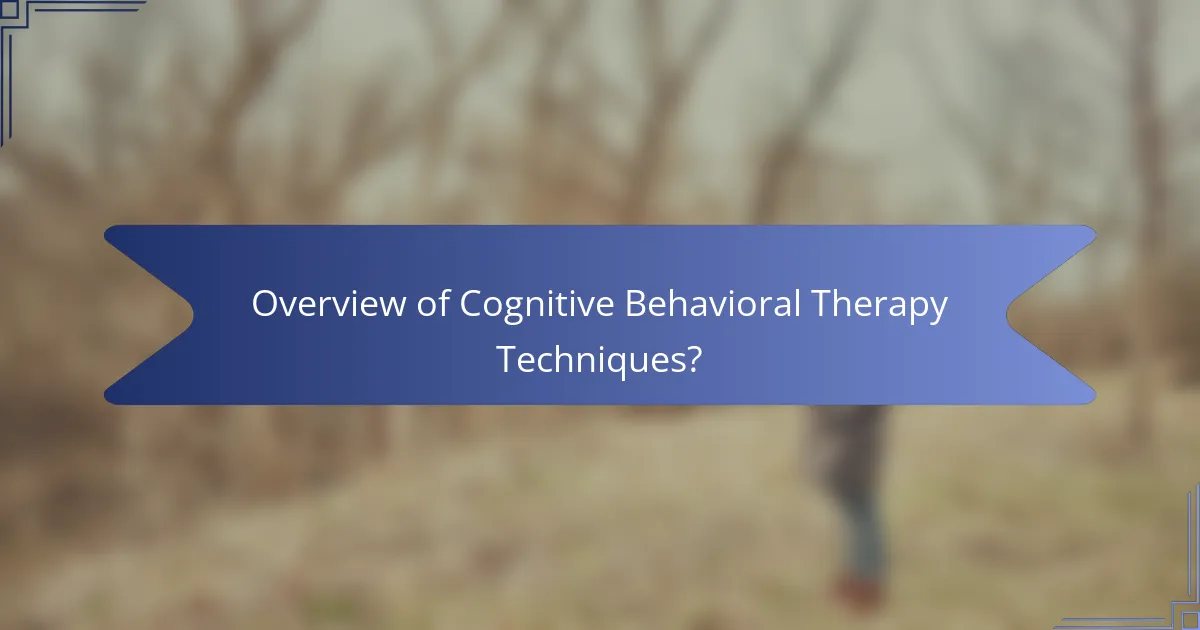
Overview of Cognitive Behavioral Therapy Techniques?
Cognitive Behavioral Therapy (CBT) techniques effectively promote personal growth and emotional resilience. These strategies include cognitive restructuring, exposure therapy, and mindfulness practices to challenge negative thoughts and behaviors.
Cognitive restructuring helps individuals identify and reframe distorted thinking patterns, enhancing emotional regulation. Exposure therapy gradually exposes clients to feared situations, reducing anxiety over time. Mindfulness practices cultivate present-moment awareness, fostering emotional resilience.
Incorporating these techniques can lead to significant improvements in mental health, with studies showing up to a 60% reduction in symptoms for many individuals. These transformative strategies empower individuals to take control of their thoughts and emotions, facilitating lasting change.
What are the core principles of Cognitive Behavioral Therapy?
Cognitive Behavioral Therapy (CBT) principles focus on identifying and changing negative thought patterns and behaviors. Key techniques include cognitive restructuring, behavioral activation, exposure therapy, and mindfulness practices. These strategies enhance emotional resilience and facilitate personal growth by promoting healthier thinking and coping mechanisms.
How does Cognitive Behavioral Therapy promote personal growth?
Cognitive Behavioral Therapy (CBT) promotes personal growth by restructuring negative thought patterns and fostering emotional resilience. CBT techniques, such as cognitive restructuring and exposure therapy, empower individuals to challenge unhelpful beliefs and develop healthier coping mechanisms.
This process enhances self-awareness and encourages proactive behavior, leading to improved emotional regulation. As a result, individuals experience increased confidence and a greater sense of control over their lives. Research indicates that consistent application of CBT techniques can significantly enhance personal development outcomes.
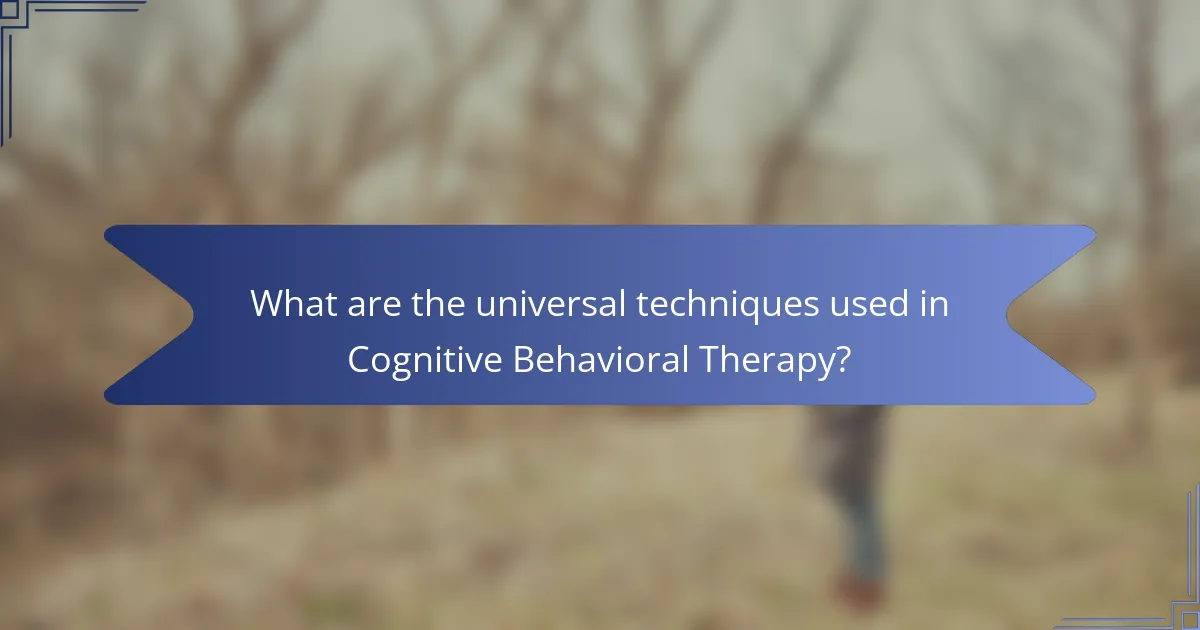
What are the universal techniques used in Cognitive Behavioral Therapy?
Cognitive Behavioral Therapy employs techniques like cognitive restructuring, exposure therapy, behavioral activation, and mindfulness to enhance emotional resilience. These strategies focus on altering negative thought patterns and behaviors, fostering personal growth.
Cognitive restructuring identifies and modifies distorted thinking. Exposure therapy gradually confronts fears, reducing avoidance behaviors. Behavioral activation encourages engagement in enjoyable activities, improving mood. Mindfulness practices enhance awareness and acceptance of thoughts and feelings, promoting emotional stability.
How do cognitive restructuring techniques work?
Cognitive restructuring techniques work by identifying and challenging negative thought patterns, leading to healthier cognitive responses. These techniques enhance emotional resilience by promoting positive thinking and adaptive behavior. They include methods like reframing, thought records, and cognitive reframing, which help individuals recognize and alter distorted beliefs. As a result, users experience improved mood and reduced anxiety, fostering personal growth.
What role does exposure therapy play in personal development?
Exposure therapy plays a crucial role in personal development by helping individuals confront and overcome their fears. This technique, rooted in cognitive behavioral therapy, fosters emotional resilience and promotes personal growth. By gradually exposing individuals to anxiety-provoking stimuli, exposure therapy reduces avoidance behaviors and enhances coping strategies. As a result, participants often experience significant improvements in their confidence and overall emotional well-being. This transformative process empowers individuals to face challenges, leading to a more fulfilling life.
How are behavioral activation strategies implemented?
Behavioral activation strategies are implemented through structured planning and engagement in meaningful activities. Therapists work with clients to identify specific goals and barriers, creating a tailored action plan. Clients are encouraged to schedule activities that promote positive emotions, gradually increasing their involvement over time. Regular review sessions help assess progress and adjust strategies as needed. This approach enhances emotional resilience by breaking the cycle of avoidance and inactivity.
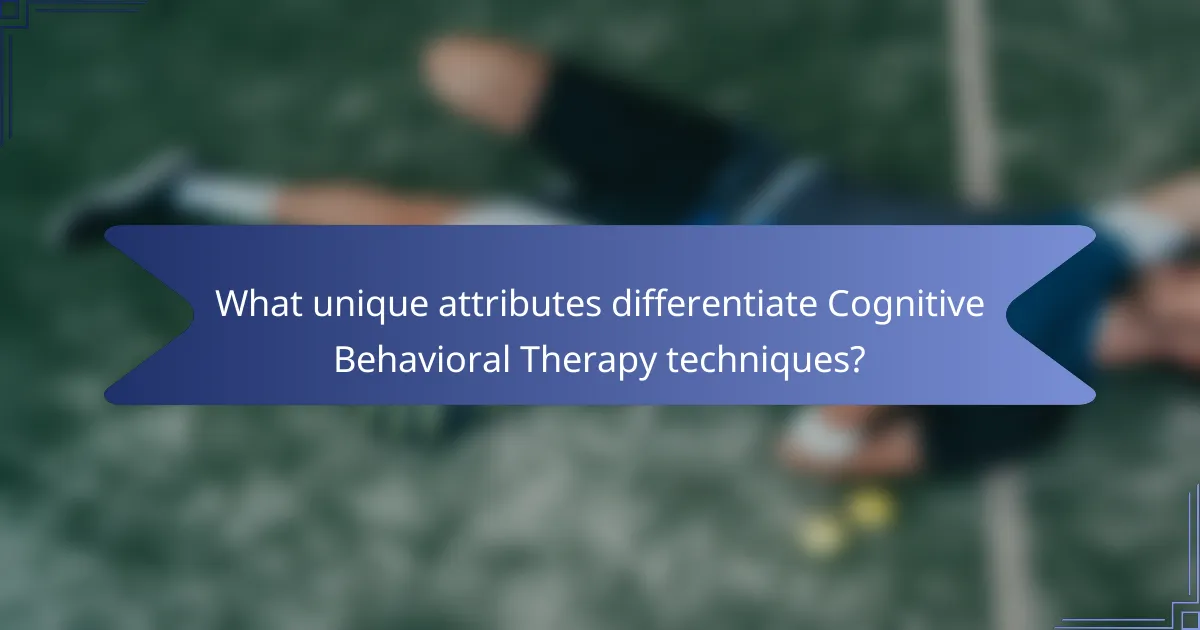
What unique attributes differentiate Cognitive Behavioral Therapy techniques?
Cognitive Behavioral Therapy techniques are distinguished by their focus on changing thought patterns to influence behavior. Unique attributes include structured sessions, emphasis on goal-setting, and the use of cognitive restructuring. These techniques promote self-awareness and empower individuals to challenge negative beliefs, fostering emotional resilience. Additionally, they often incorporate practical exercises, such as journaling and exposure tasks, to reinforce learning and facilitate personal growth.
How does the Socratic method enhance understanding in therapy?
The Socratic method enhances understanding in therapy by fostering critical thinking and self-reflection. This technique encourages clients to explore their beliefs and assumptions through guided questioning. As a result, clients gain deeper insights into their thoughts and behaviors, promoting personal growth and emotional resilience. The process also helps identify cognitive distortions, enabling more effective application of cognitive behavioral therapy techniques. This unique attribute of the Socratic method makes it a valuable tool in therapeutic settings.
What is the significance of thought records in Cognitive Behavioral Therapy?
Thought records are significant in Cognitive Behavioral Therapy as they help individuals identify and challenge negative thought patterns. By documenting thoughts, emotions, and behaviors, clients gain insights into their cognitive distortions. This process enhances self-awareness and fosters emotional resilience. Regular use of thought records can lead to improved coping strategies and personal growth. They serve as a practical tool for tracking progress and reinforcing positive changes in behavior and mindset.
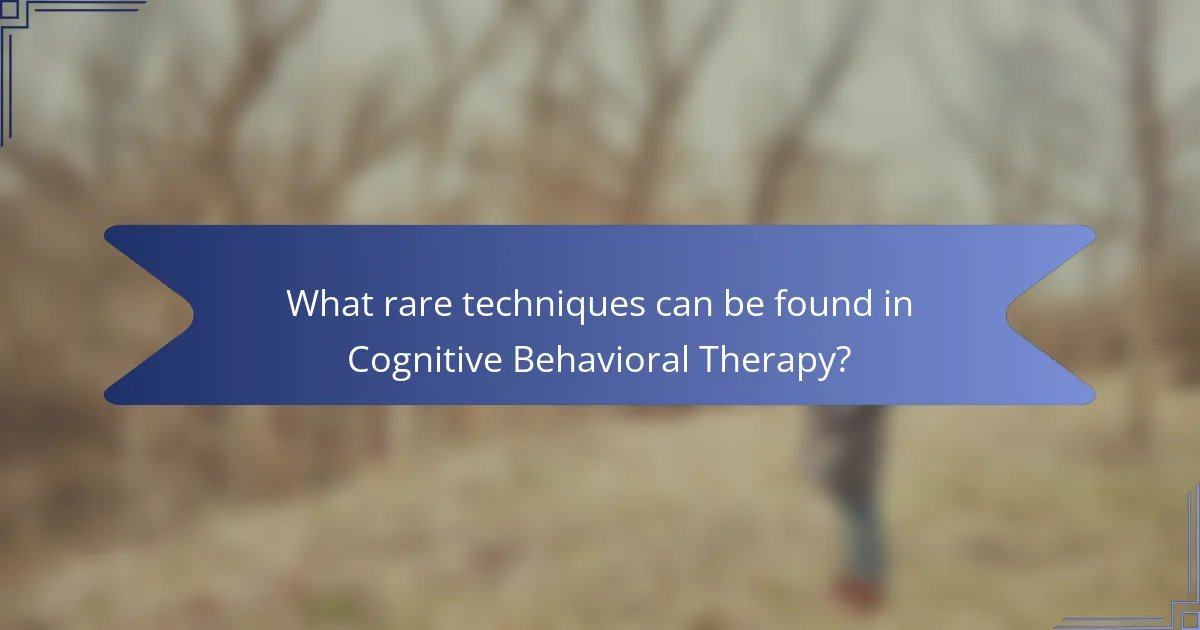
What rare techniques can be found in Cognitive Behavioral Therapy?
Cognitive Behavioral Therapy (CBT) utilizes rare techniques such as schema therapy, which addresses deep-rooted beliefs, and mindfulness-based cognitive therapy, integrating mindfulness practices to enhance emotional regulation. These techniques foster transformative personal growth and emotional resilience by targeting underlying cognitive patterns and promoting present-moment awareness.
How does mindfulness integration enhance Cognitive Behavioral Therapy?
Mindfulness integration significantly enhances Cognitive Behavioral Therapy (CBT) by fostering present-moment awareness. This approach allows individuals to recognize and alter negative thought patterns more effectively. Mindfulness practices, such as meditation and breathing exercises, cultivate emotional regulation, reducing anxiety and stress. As a result, clients experience improved resilience and a greater capacity for self-reflection. Studies indicate that combining mindfulness with CBT can lead to a 30% increase in treatment efficacy, demonstrating its unique attribute as a transformative strategy for personal growth.
What is the role of acceptance and commitment therapy in personal resilience?
Acceptance and commitment therapy (ACT) enhances personal resilience by promoting psychological flexibility. This approach encourages individuals to accept their thoughts and feelings rather than avoid them, fostering emotional strength. ACT emphasizes mindfulness and values-based living, which can lead to increased commitment to personal goals and improved coping strategies. Research indicates that ACT can significantly reduce anxiety and depression, contributing to overall emotional resilience. By integrating acceptance and commitment practices, individuals can better navigate life’s challenges and cultivate a stronger sense of self.
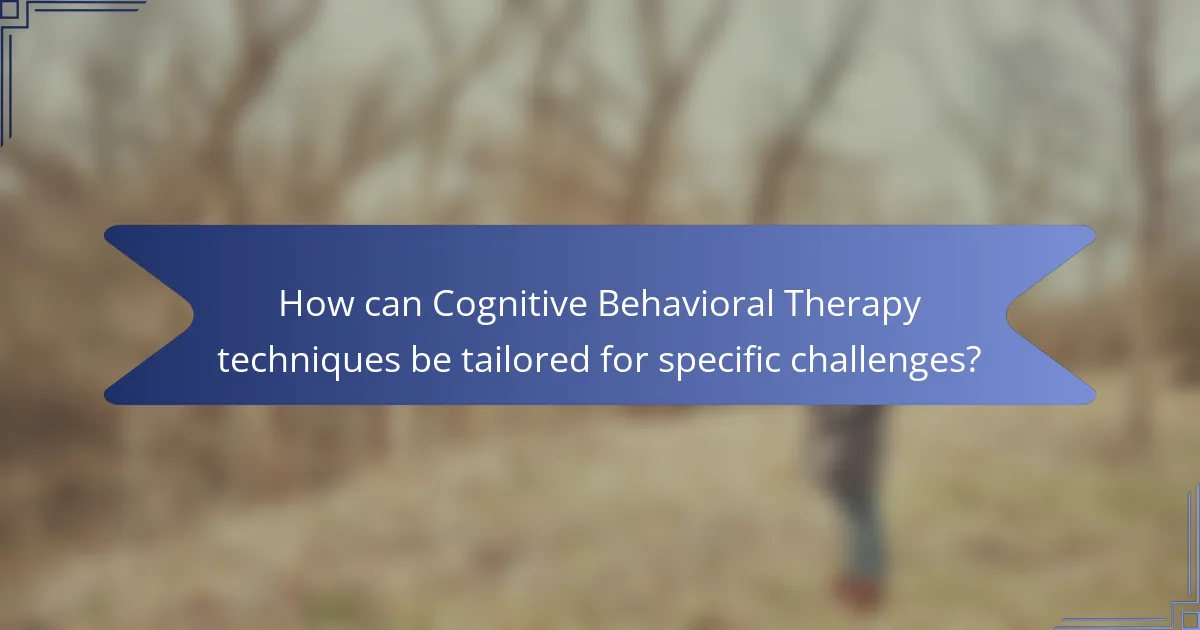
How can Cognitive Behavioral Therapy techniques be tailored for specific challenges?
Cognitive Behavioral Therapy (CBT) techniques can be customized to address specific challenges effectively. Tailoring these strategies enhances personal growth and emotional resilience.
For anxiety, techniques like exposure therapy help individuals confront fears gradually. In depression, cognitive restructuring assists in challenging negative thought patterns. For stress management, mindfulness-based CBT promotes relaxation and awareness.
Unique attributes of tailored CBT include personalized goal setting and the integration of individual coping mechanisms. This customization ensures that clients engage with methods that resonate with their experiences, maximizing therapeutic effectiveness.
What strategies are effective for managing anxiety through Cognitive Behavioral Therapy?
Cognitive Behavioral Therapy (CBT) employs various effective strategies to manage anxiety. These include cognitive restructuring, exposure therapy, mindfulness techniques, and behavioral activation.
Cognitive restructuring helps individuals identify and challenge negative thought patterns, leading to healthier thinking. Exposure therapy gradually exposes individuals to anxiety-provoking situations, reducing fear over time. Mindfulness techniques promote present-moment awareness, allowing individuals to detach from anxious thoughts. Behavioral activation encourages engagement in enjoyable activities, countering feelings of avoidance associated with anxiety.
These strategies collectively enhance emotional resilience, fostering personal growth through structured techniques.
How can Cognitive Behavioral Therapy assist in overcoming depression?
Cognitive Behavioral Therapy (CBT) effectively assists in overcoming depression by identifying and changing negative thought patterns. CBT techniques, such as cognitive restructuring and behavioral activation, empower individuals to challenge distorted beliefs and engage in positive activities. Research shows that CBT can reduce depressive symptoms significantly, with studies indicating a 60-70% improvement rate among participants. This approach fosters emotional resilience by equipping individuals with practical skills to manage their thoughts and behaviors, ultimately promoting personal growth.
What techniques are useful for improving self-esteem with Cognitive Behavioral Therapy?
Cognitive Behavioral Therapy techniques for improving self-esteem include cognitive restructuring, behavioral activation, and self-compassion exercises. Cognitive restructuring helps identify and challenge negative thoughts, fostering a more positive self-image. Behavioral activation encourages engagement in enjoyable activities, enhancing feelings of accomplishment. Self-compassion exercises promote kindness towards oneself, which is crucial for emotional resilience. These strategies collectively empower individuals to build healthier self-perceptions.
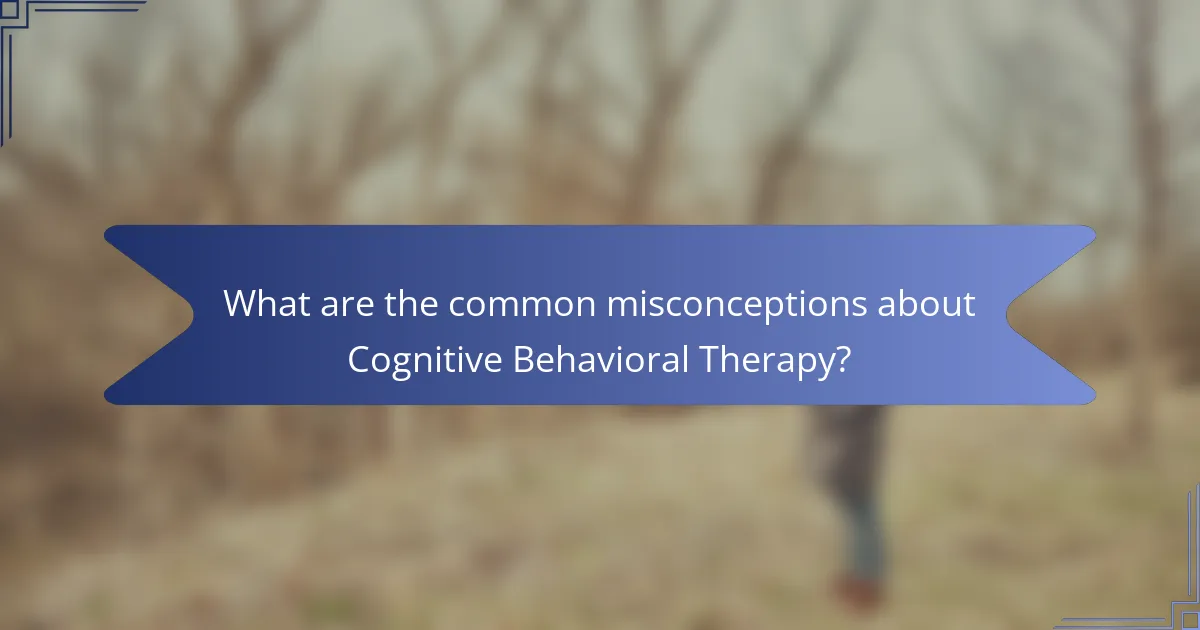
What are the common misconceptions about Cognitive Behavioral Therapy?
Cognitive Behavioral Therapy is often misunderstood as a quick fix for deep-seated issues. Many believe it only involves changing negative thoughts, overlooking its comprehensive approach to emotional resilience. Another misconception is that CBT is solely focused on the present, while it also addresses past experiences impacting current behaviors. Some people think it requires a significant time commitment, but many techniques can be applied in short sessions. Lastly, there is a belief that CBT is only for anxiety and depression, neglecting its effectiveness for a wide range of mental health challenges, including stress management and relationship issues.
Is Cognitive Behavioral Therapy only for severe mental health issues?
Cognitive Behavioral Therapy (CBT) is not limited to severe mental health issues; it is effective for various challenges. CBT techniques can help with anxiety, stress, and everyday emotional struggles. Many individuals benefit from CBT to enhance personal growth and emotional resilience. Research shows that CBT can improve coping strategies and overall well-being, making it suitable for a broad audience, not just those with severe conditions.
Can anyone practice Cognitive Behavioral Therapy techniques effectively?
Yes, anyone can practice Cognitive Behavioral Therapy techniques effectively with proper guidance and commitment. These techniques focus on changing negative thought patterns, which can lead to improved emotional resilience and personal growth. Research shows that individuals can learn and apply these strategies through self-help resources or with the support of a trained therapist. The key is consistent practice and willingness to engage in self-reflection, making it accessible to a wide range of people.

What are the best practices for implementing Cognitive Behavioral Therapy techniques?
To effectively implement Cognitive Behavioral Therapy techniques, focus on structured practice, self-reflection, and consistent application. Key practices include identifying negative thought patterns, employing cognitive restructuring, and engaging in behavioral experiments.
1. Identify negative thoughts: Recognize automatic thoughts that contribute to emotional distress.
2. Challenge these thoughts: Assess the evidence for and against these thoughts to reframe them.
3. Behavioral activation: Engage in activities that promote positive emotions and reduce avoidance.
4. Mindfulness: Incorporate mindfulness techniques to enhance awareness of thoughts and feelings without judgment.
5. Goal setting: Establish clear, achievable goals to track progress and maintain motivation.
These strategies foster personal growth and emotional resilience through ongoing practice and adaptation.
How can individuals track their progress in Cognitive Behavioral Therapy?
Individuals can track their progress in Cognitive Behavioral Therapy by maintaining a structured journal, setting measurable goals, and regularly reviewing their thoughts and behaviors. A journal helps document feelings and triggers, while measurable goals provide clear benchmarks for improvement. Regular reviews allow individuals to assess changes in their emotional resilience and identify patterns in their cognitive processes. This tracking process enhances self-awareness and supports ongoing personal growth.
What common mistakes should be avoided when using Cognitive Behavioral Therapy techniques?
To effectively use Cognitive Behavioral Therapy techniques, avoid common mistakes such as neglecting homework assignments, misinterpreting cognitive distortions, and failing to establish realistic goals. These errors can hinder personal growth and emotional resilience.
Neglecting homework assignments limits the application of learned skills. Misinterpreting cognitive distortions can lead to ineffective strategies. Failing to establish realistic goals may result in frustration and decreased motivation. Addressing these issues enhances the effectiveness of Cognitive Behavioral Therapy.
What expert insights can enhance the effectiveness of Cognitive Behavioral Therapy?
Expert insights can significantly enhance the effectiveness of Cognitive Behavioral Therapy (CBT) by incorporating evidence-based techniques. Strategies such as mindfulness integration, cognitive restructuring, and behavioral activation can deepen emotional resilience and facilitate personal growth. Research indicates that combining mindfulness practices with traditional CBT techniques can lead to improved outcomes, particularly in managing anxiety and depression. Additionally, tailoring interventions to individual needs enhances engagement and effectiveness, showcasing the importance of personalized approaches in therapy. Regular feedback and collaborative goal-setting between therapist and client further optimize the therapeutic process, ensuring that treatment aligns with the client’s unique experiences and aspirations.